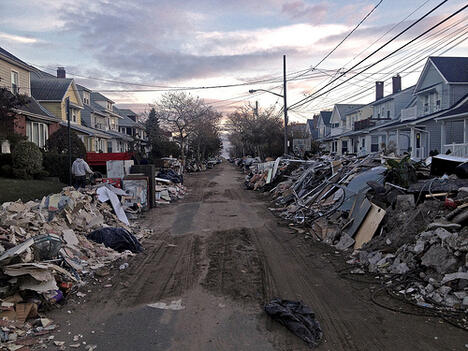Reaching a political tipping point on climate change
In his victory speech this morning, newly elected President Obama acknowledged "the destructive power of the warming planet". Last week, Mayor Bloomberg of New York City endorsed President Barack Obama in his candidacy for the US President due in part to his climate change policies. Al Gore has spoken of a political "tipping point" on climate change - a stage where politicians feel they have enough support to regulate on reducing emissions. Has this point been reached in the USA?
The leading climate blog Climate Progress puts it another way, asking if Hurricane Sandy was a "Cuyahoga River moment"? Cuyahoga River was an environmental disaster in the 1960s that led directly to stricter legislation on cleaner water.
The Rockaways, after Hurricane Sandy
Source: Ma neeks, Flickr
In July I asked Professor Robert Stavins of Harvard University when he thought the politicaltipping point in the US on climate change would happen. He also cited the Cuyahoga River disaster saying that the cause of the fire was obvious and so made the case for environmental legislation clear - Stavins thought that the cause of climate change is not obvious to many people as "we observe the weather not the climate". He was therefore pessimistic that regulation to reduce emissions would happen soon as voters need to see a "perceived or real crisis or disaster" - like many of us, he didn't count on a major political figure like Mayor Bloomberg laying his cards on the table about climate change (combined with an unusually big hurricane occurring).
Mayor Bloomberg and Governor Cuomo have provided heavyweight political backing to linking climate change to extreme weather events. In his Op Ed, Bloomberg said ""While the increase in extreme weather we have experienced in New York City and around the world may or may not be the result of it (climate change), the risk that it might be -- given this week's devastation -- should compel all elected leaders to take immediate action."
Suddenly, there are votes in action on climate change - how far will this change policies in the US and beyond?
Back to the main page of ITC environment blog.
You can also follow Alex on Twitter.




